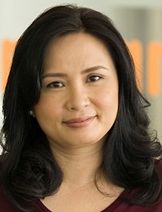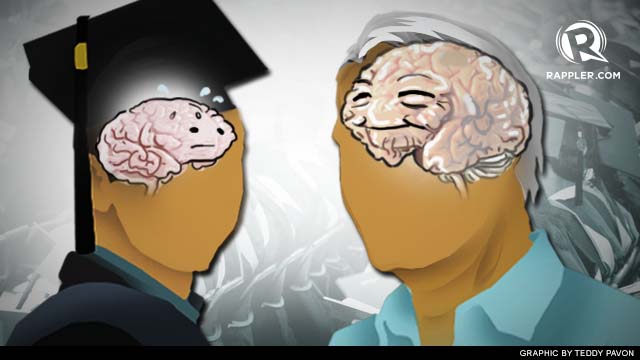SUMMARY
This is AI generated summarization, which may have errors. For context, always refer to the full article.

It’s a fine day to graduate and most graduation speeches will understandably focus on telling the youth to seize this chance in their lives while they are young and have their whole lives ahead of them. They will address these youthful souls with inspiration and impassioned advocacies. But very few of these speeches, if any, will give advice about what your parents, teachers and school officials already are, and what all graduates would really be doing for the rest of their lives: getting old.
While other parts of your body seem to be so supple and attractive right now, gaining praises from your own self bouncing off of the mirror and from your peers, there is an organ, hidden from view that will define the time you spend alive. This 3-pound organ is your brain and it grows old. There are peculiar things that happen to a brain not only when you reach 40 and beyond which seems so far off yet but as it travels a lifetime day by day starting tomorrow.
Science has made remarkable progress in learning about this universe inside our heads and so far, this is what they have seen and tested about what happens to the brain as it ages:
One, the brain learns better from the consequences of its mistakes;
Two, that it gets full; and
Three, it becomes happier.
The first one – that we learn from the consequences of our mistakes – is not as simple as it may seem. The key word is “consequences,” and not “mistakes.” Science has found that we learn much better if we are made to feel the effects of the wrong choices we make.
In every graduating class, there is always a student who everyone, including the student himself or herself, thinks he or she will most likely succeed. But behind every such student is a battalion of old-timers – parents, relatives, teachers and ancient school administrators – who are crossing their fingers almost compromising blood flow, that that student is prepared to fail many more times before he or she succeeds. And they do this because they know, oh so well, from experience, that this is what works.
Now, science has confirmed it and has even seen that the learning from a consequence of an error does not simply make you averse to the immediate feeling of “failure.” Rather, it plays into the larger decision-making process of the learning and aging brain, long after you have forgotten the “punitive” effect of the mistake you have made.
Many parents shield their kids from the consequences of their children’s mistakes. While this tender protection is understandable, they should know they are protecting them from also reaching and experiencing triumphs in the many aspects of grown-up life. In other words, insurance from mistakes is also insurance from success. That gives new meaning to the term “comprehensive insurance.”
The second insight on the brain that ages is very recent to neuroscience but quite old news, I think, to many philosophers and other scientists. A recent experiment found that older people find it difficult to learn new things NOT because they have trouble acquiring and decoding new information but because they have more difficulty letting go of old stuff contained in their minds.

This is what wise thinkers have imparted time and time again – that it is more difficult to shed than to learn. But the contribution of this recent study is that it revealed what makes this happen inside our heads.
It showed that learning to be complete essentially has to happen in two stages: acquisition and storage. The study found that old people are still wired with as much mettle to absorb new information. However, absorbing is not the same as “learning.” In order to learn, one has to store this information in a web of content already in one’s head. The study found that new stuff cannot get into this old web because the old ones just won’t abandon their posts in the aging brain.
Maybe this is the more important part of what it means to be educated for both the aging and the aged – that you always leave room in your neural attic for change and doubt. Some professions make a killing and force the hand of success by holding on with gecko-strength, to old beliefs. While some beliefs still make sense and help us a lot more, I think it no longer makes sense, given new discoveries about what makes us human or helps us become better humans.
This is, I think, what makes the scientific mind revolutionary. While no one is immune to the aging process, the scientific mind is habituated to not being habituated. It constantly resists set wiring and somewhat changes it. By nature, science rigorously pursues an understanding but always against the backdrop that this understanding may change, depending on new information verified later on.
The self-correction is somewhat built-in, even if it still hurts as much, unlike in other lives of the mind. I am deliberate in citing the “scientific mind” instead of “scientists.” You do not need to beg for or make a living off of a degree/s in science to learn how to think scientifically.
The last insight on the aging brain is that generally, despite all the turmoils and the messy forks on the road where you had sometimes chosen the road less travelled and it sucked, the aging brain becomes happier.
It is like it grows a sieve where we don’t really forget the episodes of pain and sorrow, but we let them all land where they should – in the past – and we somehow are left to marinate in the good, living happy memories we have made. This is not simply a passive submission but an active acknowledgment of what really matters in the end like Simon and Garfunkel’s song, “Bookends:” “…preserve your memories…they’re all that’s left you…”
And so graduates and ancient teachers and school officials, feast on the possibilities of your own brain that has aged about 3 minutes more since you started reading this. An aging brain is not a tragedy; it is the nature of things. May we all live with this fact as revolutionaries. – Rappler.com
Add a comment
How does this make you feel?
There are no comments yet. Add your comment to start the conversation.